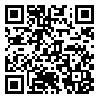Volume 17, Issue 1 (Spring 2020)
Sci J Iran Blood Transfus Organ 2020, 17(1): 12-19 |
Back to browse issues page
Abstract: (3101 Views)
Abstract
Background and Objectives
Human platelet antigens (HPAs) are polymorphic structures located on the membrane of platelets (PLTs). These antigens have important role in clinical situations like refractoriness to platelet transfusion which is the most important cause of transfusion related mortality and morbidity in patients by recurrent platelet transfusion. Alloimmunization against the human platelet antigen 1 (HPA-1) is assumed as the major cause of platelet refractoriness in white population. Due to the variation of platelet antigens frequencies among ethnic groups; in this study, we investigated the frequency of HPA-1 alleles on Turkmen blood donors.
Materials and Methods
In this descriptive study, 80 non-relatives of Turkmen donors were randomly sampled from Aq Qala blood center during the year 2018.
Results
The mean age of the subjects was 38.2 ± 7.7 years (range: 18-59 years) and all were male. Molecular genotyping of HPA-1 in this study revealed that HPA-1a allele was detected in 96% donors and the HPA-1a/1b heterozygote was found in 4% of individuals. No one was HPA-1bb homozygous (frequency 0%).
Conclusions
It was declared that 96% of Turkmen blood donors have shown HPA-1a similar to the frequency which was previously detected in Iranian blood donors and HPA-1b/b homozygous was not found in all donors. So it could be concluded that HPA-1a alloimmunization may not be involved in platelet refractoriness in Turkmen ethnicity.
Background and Objectives
Human platelet antigens (HPAs) are polymorphic structures located on the membrane of platelets (PLTs). These antigens have important role in clinical situations like refractoriness to platelet transfusion which is the most important cause of transfusion related mortality and morbidity in patients by recurrent platelet transfusion. Alloimmunization against the human platelet antigen 1 (HPA-1) is assumed as the major cause of platelet refractoriness in white population. Due to the variation of platelet antigens frequencies among ethnic groups; in this study, we investigated the frequency of HPA-1 alleles on Turkmen blood donors.
Materials and Methods
In this descriptive study, 80 non-relatives of Turkmen donors were randomly sampled from Aq Qala blood center during the year 2018.
Results
The mean age of the subjects was 38.2 ± 7.7 years (range: 18-59 years) and all were male. Molecular genotyping of HPA-1 in this study revealed that HPA-1a allele was detected in 96% donors and the HPA-1a/1b heterozygote was found in 4% of individuals. No one was HPA-1bb homozygous (frequency 0%).
Conclusions
It was declared that 96% of Turkmen blood donors have shown HPA-1a similar to the frequency which was previously detected in Iranian blood donors and HPA-1b/b homozygous was not found in all donors. So it could be concluded that HPA-1a alloimmunization may not be involved in platelet refractoriness in Turkmen ethnicity.
| Rights and permissions | |
 |
This work is licensed under a Creative Commons Attribution-NonCommercial 4.0 International License. |



